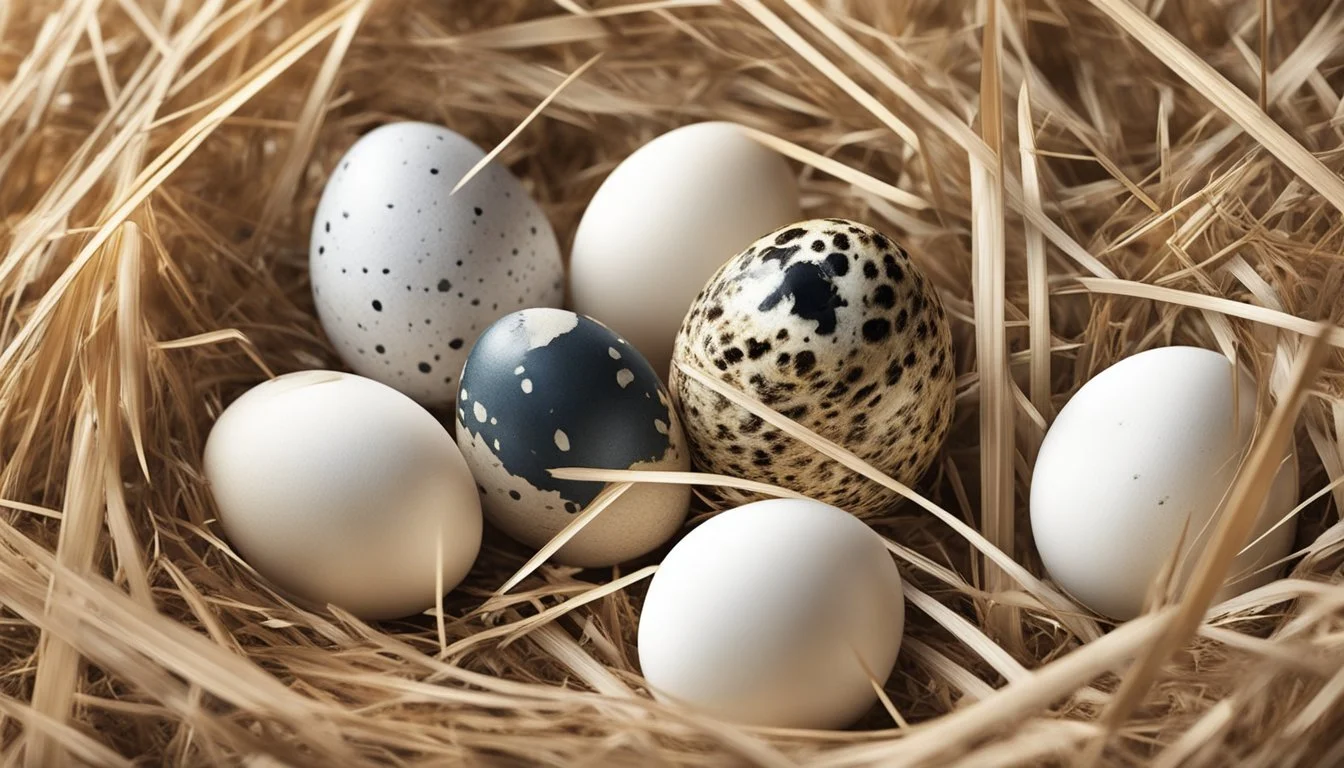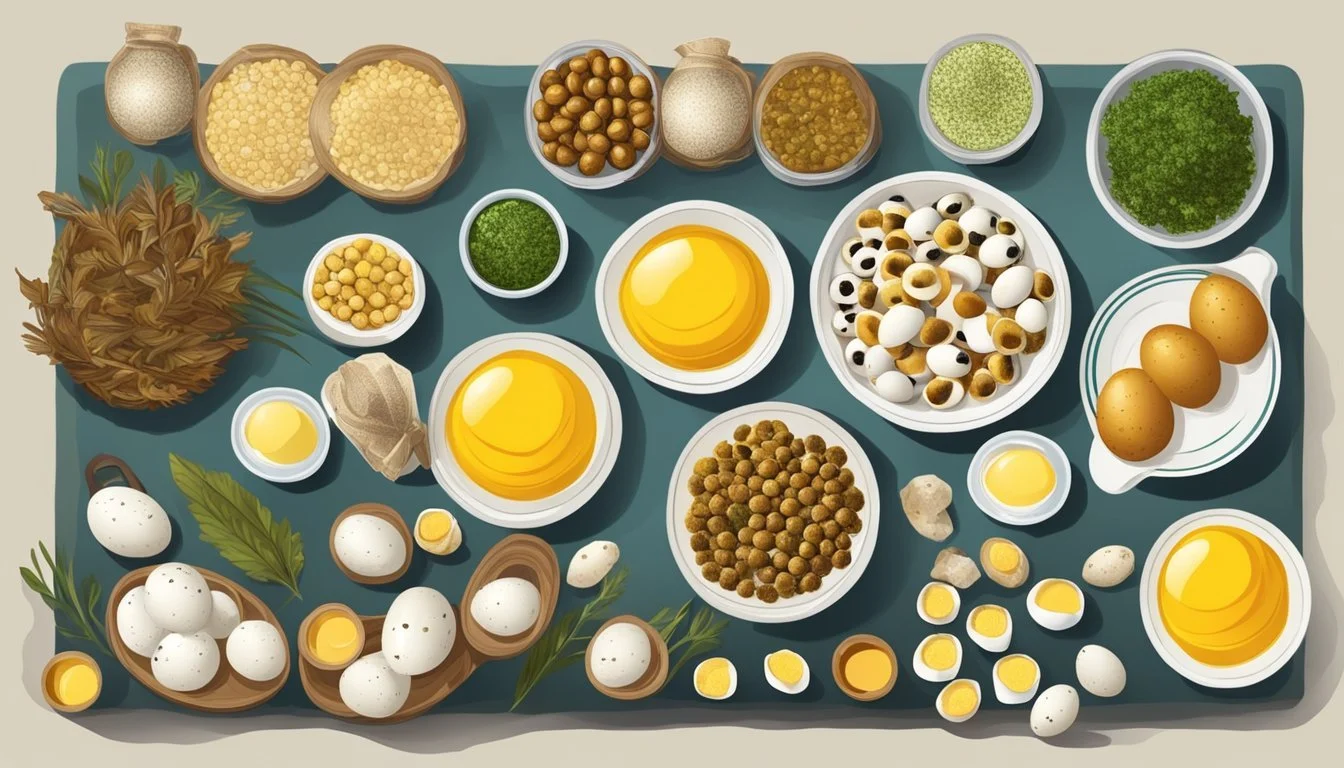Quail Eggs Substitutes
Best Alternatives for Every Recipe
For those seeking alternatives to quail eggs in their cooking and baking, understanding the best substitutes can make all the difference. Chicken eggs are often the go-to substitute due to their similar texture, though they bring a slightly stronger flavor. Duck eggs offer a richer and creamier alternative, ideal for adding a luxurious touch to dishes.
Plant-based substitutes are increasingly popular among those with dietary preferences or restrictions. Ground flaxseed and chia seeds mixed with water serve as excellent egg replacements, providing the necessary binding and moisture. These substitutes not only cater to vegan or allergy-sensitive diets but also pack a nutritional punch with added protein and omega-3s.
Each substitute brings its own unique benefits and can be selected based on the desired culinary outcome. From maintaining texture in delicate dishes to enhancing the nutritional profile, there are versatile options to suit various dietary needs and preferences.
Understanding Quail Eggs
Quail eggs offer a unique nutritional profile and diverse culinary applications. They differ significantly from chicken eggs in both nutrient content and culinary uses, which makes them a versatile ingredient in various dishes.
Nutritional Comparison with Chicken Eggs
Quail eggs are known for their rich nutrient content. On a calorie basis, they provide slightly more energy than chicken eggs, with each quail egg offering 5 kcal more. These eggs are also higher in protein, delivering an additional 0.49g per egg.
Quail eggs have a richer fat content, with 1.58g more fat per egg compared to chicken eggs. Furthermore, quail eggs boast higher levels of phosphorus, zinc, calcium, and selenium, contributing to their slightly richer taste. Vitamin B12 and iron are also found in greater quantities, benefiting those who need to boost their intake of these essential nutrients.
Culinary Uses of Quail Eggs
Quail eggs are a delicacy in many cuisines due to their delicate flavor and appealing appearance. They are often used as a garnish for salads, adding a touch of elegance and richness. In culinary applications, these eggs can be fried, scrambled, or made into tiny, flavorful omelets.
Quail eggs also work well in custards and frittatas owing to their creamy texture. Their small size makes them ideal for individual servings or as components in larger dishes. Whether incorporated into savory pies or used to enhance the texture of baked goods, quail eggs offer a variety of uses that can elevate everyday culinary creations.
These eggs are particularly valued for their ability to add a delicate flavor to dishes without overpowering other ingredients.
Common Substitutes for Quail Eggs
Quail eggs have a delicate flavor and a high nutrient concentration, making them unique, but there are effective substitutes that can match their culinary role and nutritional benefits.
Plant-Based Alternatives
Tofu is a versatile vegan substitute and can replicate the texture of quail eggs in recipes. Silken tofu, in particular, has a creamy consistency that blends well in batters or custards.
Chia Seeds mixed with water form a gelatinous texture. This mixture of 1 tablespoon of chia seeds to 3 tablespoons of water can replace eggs in baking recipes, providing structure while meeting dietary restrictions.
Mashed Banana works as an egg substitute, offering a binding quality in desserts. It's especially suited for recipes where a hint of sweetness is acceptable.
Aquafaba, the liquid from canned chickpeas, can mimic egg whites. Three tablespoons of aquafaba equal one whole egg, and its foaming properties make it ideal for meringues or fluffy textures.
Dairy and Poultry Options
Chicken Eggs are commonly used as a substitute for quail eggs. They have a similar texture, though their flavor is slightly more pronounced. One large chicken egg is roughly equivalent to five quail eggs in recipes.
Duck Eggs offer a richer and creamier texture compared to quail eggs. They are larger in size and can add a luxurious touch to dishes where fat content and texture are important.
Buttermilk and yogurt can also serve as egg substitutes in baking. They provide moisture and the necessary fat content, making them suitable for cakes, muffins, and pancakes. Using ¼ cup of either buttermilk or yogurt can replace one quail egg in recipes.
Substitutes Usage in Different Recipes
Incorporating egg substitutes varies based on the type of recipe, affecting factors such as flavor, texture, and binding properties. This guide explores how to use substitutes in both baking and cooking applications to achieve desired results.
Baking and Desserts
When substituting quail eggs in baking, consider flax eggs (1 tablespoon flaxseed meal + 2.5 tablespoons water) for their binding properties. They add moisture and a slight nutty flavor, ideal for muffins and waffles. Alternatively, applesauce or pureed fruit can replace quail eggs, adding sweetness and moisture; use 1/4 cup per egg.
Baking soda combined with vinegar (1 teaspoon soda + 1 tablespoon vinegar) acts as a leavening agent, suitable for light, fluffy cakes. Potato starch or gelatin helps in thickening custards and other thick desserts. Agar agar is another good substitute, particularly for vegan recipes, offering similar binding and gelling effects.
Commercial vegan products like Just Egg work well in baked goods, providing structure similar to eggs without altering the flavor too much. Adjust the amount based on the recipe's requirements.
Cooking and Main Dishes
In cooking, quail egg substitutes like tofu scrambles (using silken tofu) or Just Egg work well in scrambled eggs or omelets. Firm tofu mixed with nutritional yeast and spices mimics the texture and flavor of scrambled eggs. For binding in meatloaves or patties, flax eggs and chia eggs (similar to flax eggs but using chia seeds) are effective.
In dishes requiring extra moisture or creaminess, like custards, pureed fruit or potato starch can be used; ensure to adjust for the fact that these substitutes may affect the cooking time and texture. Integrating these substitutes into various recipes can help maintain the desired final product's integrity and taste.
Nutritional Considerations
When considering substitutes for quail eggs, it's important to evaluate the nutritional profile of alternatives. Key nutrients such as protein, vitamins, and minerals should be compared to ensure balanced dietary intake.
Protein and Fiber Content
Quail eggs are known for their high protein content. Each quail egg provides approximately 1 gram of protein, which is essential for muscle repair and growth. When looking for substitutes, consider sources that offer comparable protein levels. Duck eggs, for example, are an excellent substitute with a similar protein profile.
Chia seeds and various types of nuts are notable for their protein and fiber content. Chia seeds contain about 17 grams of protein and 34 grams of fiber per 100 grams, making them a good plant-based alternative. Nuts such as almonds provide approximately 21 grams of protein per 100 grams.
Vitamins, Minerals, and Antioxidant Levels
Quail eggs are rich in vitamins and minerals, including vitamin A, B12, iron, phosphorus, and selenium. These nutrients play a crucial role in various bodily functions, from immune support to bone health.
Selenium, praised for its antioxidant properties, is present in decent amounts in quail and duck eggs. Vegetables such as mushrooms can also be good alternatives; portobello mushrooms, for instance, are rich in selenium and other essential vitamins and minerals.
For those considering egg substitutes due to allergies or dietary restrictions, tofu and fortified grains offer valuable micronutrients, including iron and B vitamins. Eggs from other birds like ducks or chickens may also serve as suitable replacements, delivering many of the same antioxidants and minerals found in quail eggs.
Practical Tips for Substitution
When replacing quail eggs in your recipes, consider how the change will affect texture and cooking time. These factors are vital for achieving desired results in both savory and sweet dishes.
Adjusting Recipes for Texture and Binding
Substitutes like duck eggs and chicken eggs can alter the texture and binding of a dish. Duck eggs offer a rich, creamy yolk that enhances moisture and richness in baked goods, while chicken eggs are versatile, working well in most recipes due to their wide availability.
In vegan and egg-free cooking, flax seeds and chia seeds can replace quail eggs. A flax egg (1 tablespoon flaxseed meal + 2 ½ tablespoons water) or chia egg (1 tablespoon chia seeds + 3 tablespoons water) adds moisture and binding. Mashed banana or nut butter are other effective alternatives, though they may slightly change the flavor and texture.
Considering Cooking Time and Temperature
Cooking times and temperatures often need adjustment when substituting quail eggs. Larger eggs, like duck or chicken eggs, take longer to cook. Monitor dishes to avoid overcooking, which can affect texture.
For precise results, follow these guidelines: If baking, reduce the oven temperature by 25°F when using larger eggs. Adjust cooking times accordingly. Vegan options like flax and chia eggs may not require significant temperature changes, but keep an eye on consistency and texture.
Knowing these aspects ensures successful substitutions for quail eggs, maintaining the desired outcome in your culinary creations.
Exploring Cultural and Dietary Preferences
Quail eggs are often replaced in diets due to health, ethical, or dietary reasons. Different options are adopted based on specific needs, ranging from vegan solutions to allergy-friendly choices.
Vegan and Vegetarian Options
Vegan and vegetarian diets rely on innovative alternatives to animal products. For quail egg substitutes, tofu can mimic the texture and appearance of scrambled eggs. Tofu scrambles are a popular choice because they offer a similar consistency and are high in protein.
Chia seeds and flaxseeds also serve as excellent egg replacements. When mixed with water, they form a gel-like consistency that binds ingredients in recipes, adding fiber and nutritional benefits. The commercial product JUST Egg provides a plant-based, convenient alternative, making it simple for those seeking to avoid animal products.
Allergy-Friendly and Low-Cholesterol Choices
Individuals with egg allergies or dietary restrictions seek alternatives that meet their nutritional needs without triggering allergic reactions. Products like Ener-G Egg Replacer, which is free from eggs, gluten, and dairy, cater to allergy sufferers.
For those requiring low-cholesterol options, egg substitutes like egg whites or cholesterol-free products such as Egg Beaters are ideal. Egg whites are a natural low-cholesterol choice, providing protein without the added fats found in whole eggs.
In both cases, these substitutes ensure that dietary needs are met while maintaining nutritional value, making them suitable for people with specific health considerations.
Economic and Availability Factors
Consumers often consider both cost and availability when searching for alternatives to quail eggs. Depending on local markets and resources, options like chicken eggs can vary significantly in these aspects.
Cost Comparison between Quail Eggs and Alternatives
Quail eggs typically cost more per dozen compared to common substitutes like chicken eggs. Prices for quail eggs can range between $5 to $20 per bird, influenced by factors like local demand and supply chain logistics.
In contrast, chicken eggs are generally more affordable. Chicken eggs are often priced lower per dozen, making them a cost-effective alternative. The price disparity is largely due to the mass production of chicken eggs versus the niche market for quail eggs.
Egg Type Price Range (per dozen) Quail Eggs $5 - $20 Chicken Eggs Typically lower
Finding Substitutes in Local Stores
The availability of quail egg substitutes, such as chicken eggs, varies by location. In urban areas, large supermarkets frequently stock a range of egg types, whereas rural or specialty markets may have limited options.
Chicken eggs are widely available and can be found in almost any grocery store. This convenience makes them an excellent choice when quail eggs are not accessible. Other substitutes like duck eggs and duck eggs might be found in specialty stores or farmers' markets.
Checking the egg section of major grocery chains can yield various options ensuring you find the best match for your culinary needs in terms of availability and price.
Conclusion
When selecting a quail egg substitute, several factors must be taken into account. Nutritional profile is crucial; alternatives like chicken eggs and plant-based options provide varied nutrients.
Chicken eggs are larger and contain less protein and fat compared to quail eggs, making them a common substitute.
For those with dietary preferences or restrictions, plant-based egg substitutes can be an excellent choice. These substitutes cater to individuals avoiding animal products or with specific allergies.
In terms of culinary uses, consider the dish's requirements. Quail eggs add a unique flavor and texture. For similar results, select substitutes mimicking these characteristics.
A balanced diet can still be maintained with appropriate quail egg alternatives. Each option offers distinct advantages, fitting different dietary needs and culinary contexts.









